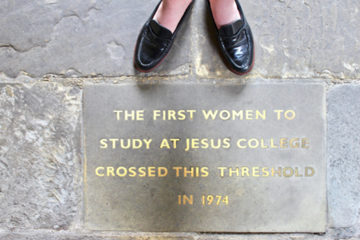Women’s Experiences at the First Coeducational College at the University of Oxford
Women’s Experiences at the First Coeducational College at the University of Oxford

My DPhil research focuses on the move to coeducational colleges at Oxford University, which initially took place in five colleges in 1974. I am interested in women’s personal experiences of being at one of the first coeducational colleges. I use their accounts of their time at college to explore the nuances involved in women entering and gaining equality within a patriarchal educational and social institution.
I grew up in Oxford and therefore I was aware that coeducation was only introduced at the university in 1974. I remember the commemorative flag-stone being put in place in the Jesus College entrance in 2014 to mark the 40th anniversary. More recently, I saw that Jesus College included information on the move to coeducation on boards that surround their current redevelopment. This initial interest prompted me to explore how the move to coeducation had been approached and researched in an academic context. This early general research indicated that, although a few historians had written about the introduction of coeducation at Oxford, often they focused on the institutions themselves and the process they went through in introducing coeducation. What the studies did not give was a detailed insight into the personal experiences of the women who entered the newly coeducational colleges. Furthermore, these studies did not provide analysis of concepts such as equality, or evaluation of how far coeducation engendered greater equality for women students.
In order to understand the personal experiences of women who were in the 1974 cohort I have used oral history as my main research methodology. I made contact with women through college alumni offices and arranged interviews with those who wished and agreed to be involved with the project. Significantly, just before I had planned to begin interviewing in Spring 2020, Covid hit and (as you all know) we had to stay inside and avoid close contact with others. This meant that I could no longer conduct my interviews in the way that oral historians are generally encouraged to do – that being, going to someone’s house and interviewing them in person. Therefore, I employed 2020 technology, and conducted my interviews over Zoom.
Some oral historians would argue that conducting interviews online limits the ability of the researcher to establish a full personal connection with their interviewee, thus preventing an interviewer from gaining a deep, personal insight into the life experiences of the participant. While this may be the case in some circumstances, my research has generally shown the reverse. I have found that often people are more willing to be interviewed online because they do not feel any awkwardness or pressure about hosting me in their home. At the same time, I believed that I felt more relaxed interviewing them online for a similar reason that I did not feel the pressure of being a guest in their house. Thus, when conducting interviews online the dynamic between the interviewee and the interviewer is more equal – no one is the host and no one is the guest, you are just two people having a conversation in a neutral space. I believe this engenders a more relaxed, open and informative conversation.
Furthermore, conducting interviews online has been temporally and economically much more efficient. I have not had to travel around the country, paying train fairs etc, in order to talk to people. I have also been able to interview people who live abroad, which I may not have been able to do in normal circumstances. Finally, interviewing online gives interviewees much more flexibility to cancel and reschedule interviews if they need to. Indeed, one of my interviewees cancelled our interview just an hour before it was scheduled. If I had travelled to her house to conduct the interview, this would have been a major inconvenience. However, because it was online we simply rescheduled it to another day. I believe that this flexibility encourages people to agree to be interviewed as they do not worry as much about the prospect of fitting an interview into their, often busy, schedules. Of course, there have been the normal issues of poor connections, inexplicable blips in the technology and so on. However, generally I would say that I have been able to conduct very successful, informative and enjoyable interviews using Zoom.
The interviews have given me a great insight into what life was like for women in newly coeducational colleges at the University of Oxford. The data I have collected so far suggests that, while many women had a positive experience, sexism did occur and women’s lives in coeducational colleges could be influenced by consciously or unconsciously prejudice attitudes. The accounts and reflections of women also indicate the complex and varying ways that women themselves thought about and defined equality of treatment. Significantly, many of the women I have interviewed equated a lack of change in college practices, or special consideration for the needs of women, with equality of treatment. However, for some, this lack of attention to the requirements of women students significantly impacted their academic and social lives in college. Thus, ultimately my research involves study of the complexities and nuances that are involved in the processes of achieving equality within an educational and social institution.
-- Florence Smith



